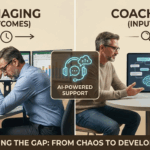
Revenue Engine Tune-Up

One of the biggest issues that revenue organizations face today are sales cycle issues. Deals are stuck, salespeople are chasing wrong leads, and the closing times are much beyond the projected time. As a result? Unpredictable revenue, demotivated sales teams and, of course, missed quotas. The good news, you just need to get back to foundations and tune-up that revenue engine; coaching done well can shorten the sales cycle and make it more efficient.
This article aims to help sales leaders to enable their teams are focused on moving the right deals to the next step.
Instead of a new tech tool, let’s get back to basics, fixing sales cycle inefficiencies, and then discuss how sales managers can coach their reps to avoid them.
Sales Cycle Inefficiencies: An Analysis
It is important to determine where the weaknesses are before you can put coaching strategies in place. Hint: the data doesn’t lie!
Common bottlenecks include:
The organization has poor qualification, which means that sellers spend time on the wrong customers. Dial in that ICP!
A lack of discovery means that the real pain has not been determined. Teach them how to dive deep with thoughtful open-ended questions.
The deals are one-threaded and are likely to fail if one of the champions loses interest. Happy ears and not multi-threading are setting up sellers for failure.
A reactive negotiation that leads to a lot of time lost and price reduction. Coach your sellers to have a strong point of view and focus on the value or impact.
All of these inefficiencies can be managed through coaching; let’s look at how.
Coaching Strategies to Address Sales Cycle Inefficiencies
1. Coaching for Better Qualification
The Problem: The problem is that the reps get assigned leads that are not likely to result in a sale because they do not conduct the fit assessment at the beginning.
Coaching Solution: Make it simple. Does the customer agree they have a problem that is worth solving right now?
Example Scenario: A rep is working on a deal where the champion is very much involved but there is no clarity on a timeline.
A coach might ask:
“Tell me in the customer’s words how they have validated they have a problem.”
“Tell me why the customer feels this is worth solving (the impact be on their business).”
“Is this a priority to solve {insert your timeframe here}?”
If the reps cannot provide the answers to these questions, it means the deal is at risk because the customer has articulated it’s a priority worth solving. Up to 60% of deals end up dying due to indecision!
2. Coaching for Effective Discovery
The Problem: The result is that reps do not identify the real business pain, and, therefore, the solutions they propose do not address the need of the customer, and the process drags on.
Coaching Solution: Simulate realistic conversations that could happen during the discovery call to teach the new agents the art of identifying the burning issues that require immediate solution.
Example Scenario: A rep is selling a workflow automation tool but struggles to drive urgency. Instead of asking, “Would you like automation to improve efficiency?” they should ask:
“What happens when your team misses deadlines due to manual processes?”
“How much revenue is lost when these inefficiencies occur?”
Elite sellers will have a point of view and share a customer case study. For example, “Many of our customers thought they were efficient but after implementing they found that they missed fewer deadlines for client onboarding which meant better adoption and reduced risk of churn and increased risk of expansion. Have you seen revenue impacted by delayed onboarding?”
You see the difference? This is why foundational skills matter!
3. Coaching for Multi-Threading & Stakeholder Engagement
The Problem: This is because companies today have complex buying processes and salespeople rely too much on one champion who may not have the decision-making authority.
Coaching Solution: Teach your reps how to create a map of the buying committee and how to approach them all.
Example Scenario: A rep is working on a deal where only one stakeholder is engaged. A coach might ask:
“Who else is involved in the decision-making process?”
“Have you met with Finance, Procurement, or IT? What are their questions?”
“If your champion left tomorrow, would the deal still move forward?”
To some extent, extend the engagement spectrum for the reps decreases the risk and enhances the deal speed.
4. Coaching for Proactive Negotiation & Closing
The Problem: The chief challenges include last minute objections, pricing concerns and or procurement delays.
Coaching Solution: Teach the reps to negotiate early and to have a plan for closing the business.
Example Scenario: A deal has been sitting in the “contract review” stage for weeks. Instead of waiting, the rep should:
Preempt objections early: “What might cause Procurement to delay this deal?”
Define clear next steps: “If we finalize pricing today, can you commit to signing by Friday?”
Leverage executive alignment: “If our VP were to talk to your CFO would that help to set some expectations?”
Reps need to influence and control the negotiation process and thus avoid any last-minute surprises. Leveraging executives can also help fast track the closing.
Tracking the Effect of Coaching on the Sales Cycle
To guarantee that the coaching is effective, sales leaders have to watch certain metrics:
Average sales cycle length: Does this mean that deals are being closed faster?
Deal conversion rates: Are better-qualified deals moving through the pipeline faster?
Multi-threading adoption: Key deals are being brought to the attention of more stakeholders?
Discounting trends: Are the reps more capable of holding the price properly?
Coaching that is data-driven will guarantee that the training is actually translating into real revenue results.
Conclusion
Sales cycle inefficiencies are costly, but coaching offers a viable solution. Thus, the sales leaders can help their teams perform the tasks, reduce the length of the sales cycle, and enhance the profitability of the sales process through intervention in qualification, discovery, multithreading, and negotiation coaching.
For sales organizations looking to grow, it is not a question of whether or not to invest in systematic and regular coaching; it is a necessity for a finely tuned revenue engine!
































